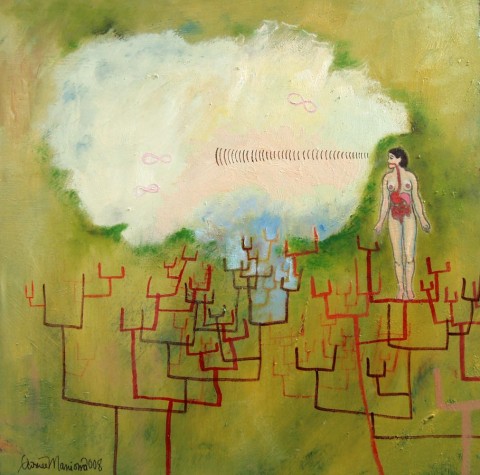But here, in this one, let’s pretend the nightmares don’t happen. In this one, let’s pretend my mother catches you before the first nightmare—the catalyst for all the others—before you ever put your hands on my skin, in my skin. In this one, let’s pretend my Mother’s House is just a house.
Let’s say she wakes up in the middle of the night with a sudden urge to check on me. Let’s say she is heading up to bed herself and needs to kiss my head one more time. Let’s say that what I didn’t know—tiny, oblivious child—is that just after I fall asleep, my mother always, has always come up to tuck me in after my restless little body has thrown off all the covers, and you, you didn’t know that either. It doesn’t matter. Any of these will do.
In this one, upon entering my room my mother screams—my mother screams—the kind of shattering scream someone might hear when a parent sees their infant toddling toward a busy street, or in the last seconds before impact in a fatal car accident, or when a woman turns to find a strange man standing in her kitchen, or when out of nowhere someone has a gun. The scream is enough to wake me just in time to see my mother jump at you; grab hold of you; try with small, dishwash-wrinkled hands to separate your skin from your bones. I stay silent in bed—although it hasn’t happened in this one, I know which of the two of you I am more afraid of.
In this one, after that night, you move out (not when I am in college—young adult of scar tissue on scar tissue—but) when I am still too young to remember exactly what happens when you go, too young to think of any of this as tragedy. All I remember, really, is that when you leave, there is a lightness in everything, and the air doesn’t suffocate us anymore.
In this one, my mother and I become close, so close (because, in this one, she knows). In this one (my mother never has to say “what is wrong with you” because) my mother knows all the things that could have been wrong with me, and when I am not listening she will say “Glory to God” that we avoided them. In this one, my mother and I cannot truly imagine that anything would be wrong with me (and isn’t it amazing, the things you don’t have to think about in the absence of trauma).
In this one, (without the damage of you) I grow up to be “wholesome” in all of the ways that my mother always wanted me to be—(I do not seek out destruction, make an enemy of everyone, tell teachers I am hollowed out, carved up inside. In this one, I do not harm my body, don’t need to feel sharpness to feel relief, don’t need to stop my head spinning by slamming it into walls, have perhaps never slammed anything into a wall, have perhaps not yet seen a body slammed into a wall. In this one, I do not date boys who hit me, marry men who hit me, leave these men, become withered and exhausted at 23, become a caricature of single motherhood—all impossible stacks of dirty dishes and crumbles of unidentifiable food in my hair).
In this one, I never even date a man, date a lovely girl who my mother—Catholic and cautious—eyes anxiously at first then grows to adore. We have matching bracelets. In this one, I excel academically (never need to switch high schools because there’s no way to go to school with a boy you have a restraining order on, never get out of classes and tests just because I can’t stop crying again and a teacher thinks excusing me is the only solution). In this one, I know exactly who I am and what I want to be, and there are no men stifling it to nothing. In this one, I get into a college far away, and my mother cries but is happy for me, and when I get there I don’t even feel free and renewed (because, in this one, there is no decaying house, no decaying town that holds in it every painful thing that I am trying to escape).

Notes from Guest Reader
I love the way that this story works in layers to tell the narrator’s lived experience on top of this fiction of what could have been and the movement between those layers. The lyricism and language is so beautiful and heartbreaking in how it pulls away from this dreamed life back to the physicality of food crumbs, dishes, and decaying buildings.


 The core workshop of SmokeLong Fitness is all in writing, so you can take part from anywhere at anytime. We are excited about creating a supportive, consistent and structured environment for flash writers to work on their craft in a community. We are thrilled and proud to say that our workshop participants have won, placed, or been listed in every major flash competition. Community works.
The core workshop of SmokeLong Fitness is all in writing, so you can take part from anywhere at anytime. We are excited about creating a supportive, consistent and structured environment for flash writers to work on their craft in a community. We are thrilled and proud to say that our workshop participants have won, placed, or been listed in every major flash competition. Community works.